The radical power of becoming a funny girl
Women in comedy are having a moment. But spend five minutes watching Issa Rae on Insecure, Ali Wong in Hard Knock Wife, or Samantha Bee on Full Frontal, and it becomes clear that their comedy isn’t just about getting laughs—it’s also a full-scale rebellion.
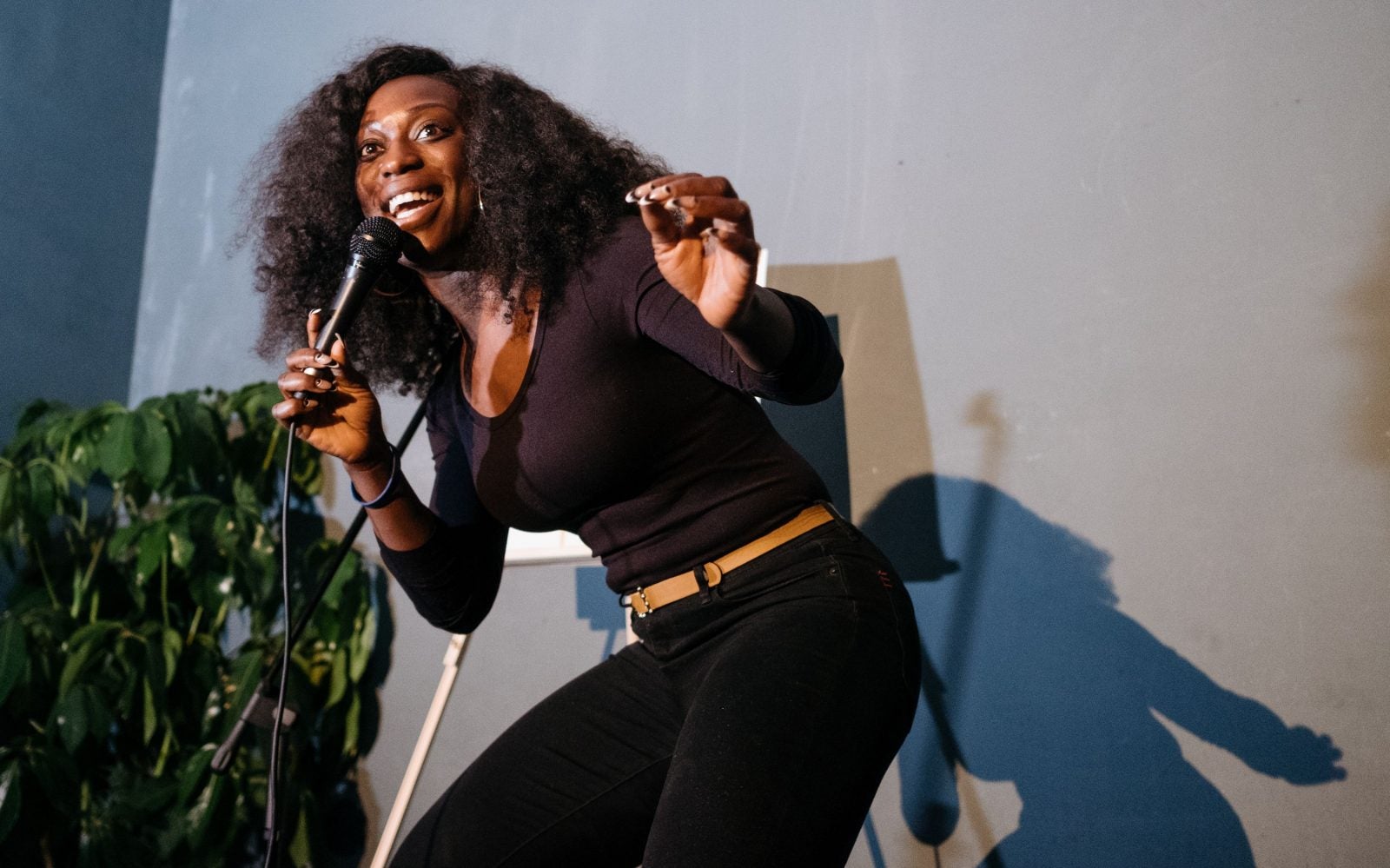

Women in comedy are having a moment. But spend five minutes watching Issa Rae on Insecure, Ali Wong in Hard Knock Wife, or Samantha Bee on Full Frontal, and it becomes clear that their comedy isn’t just about getting laughs—it’s also a full-scale rebellion.
Cracking jokes about post-pregnancy bodies or awkward sex, these women lure you into loving them—while forcing yourself to question whether you, too, might share certain qualities with the racist, sexist jerks they’re making fun of. They snatch back their imperfections from a society that wants women to apologize for everything. They refuse to let anyone, themselves included, off the hook. In their hands, it becomes clear that comedy is a weapon, enabling them, as gender expert Gina Barreca explains, to “see life’s absurdities and laugh, while dismantling and reassembling them in a more inclusive and reasonable way.” When women wield this weapon effectively, the rest of the world has no defense.
Where do women like this come from? And how can we raise a new crop of young women like them—girls confident enough in themselves and their humor to not just poke, but power-drill, holes in world’s most powerful institutions?
The answer may lie with organizations like Gold Comedy, a for-profit startup specifically geared toward teenage girls, women, and other underrepresented people. Students take online courses about how to write and tell a joke, assemble a standup comedy set, and hone their comedic voice. In a world that goes out of its way to instill self-doubt in girls from a young age, Gold Comedy founder Lynn Harris—a standup comedian herself—says that this kind of training can teach teenage girls to take up space, take risks, and own their flaws.
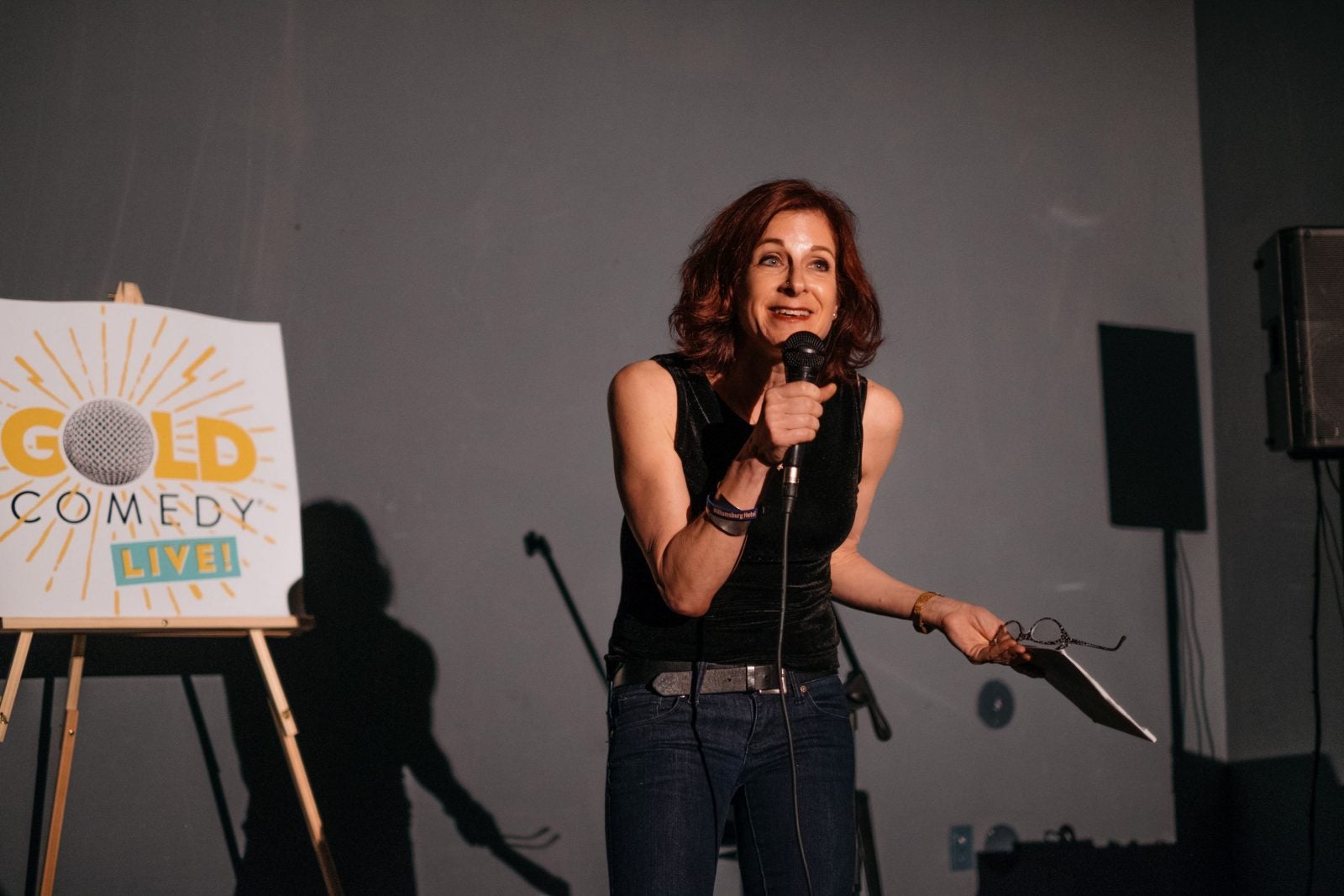
“The real power of comedy, especially standup, is that you don’t need to fix anything about who you are in order to be funny. In fact you have to be exactly who you are,” Harris says. Just as Michelle Wolf’s helium-balloon voice helps her punchlines land, or Maysoon Zayid incorporates her cerebral palsy into her routine, so do the teenage girls who take her classes learn to express, and embrace, their authentic selves.
“The thing that people tease you about, or that you’re self-conscious about, or that you wish you were more or less of—that’s your funny,” Harris says. “Instead of fixing it, in comedy, you get to double down on it.”
Democratizing comedy
Contemporary society doesn’t want girls to think of themselves as funny, and often punishes them when they do. At as early as six years old, boys begin initiating humor significantly more often than girls. “They haven’t already figured out patriarchy, but they’re already understanding that comedy is what boys do and girls laugh at,” says Harris.
Ample research shows that both men and women are significantly more likely to laugh at men, and to perceive men as funnier. In one study led by Laura Mickes, a psychology professor at University of California, San Diego, male and female students were asked to write captions for the same New Yorker cartoons. Not only were men more likely to rate their own captions as funny, but 89% of the women and 94% of men responded that men, in general, are funnier.
There’s a reason why the world is so invested in steering women away from comedy. Much of female socialization is concerned with teaching girls to make themselves attractive in the eyes of men—and to the patriarchy, nothing is less attractive than a woman who refuses to be subdued. As Naomi McAuliffe explains in The Guardian, “To be funny is to be a smartarse, to be clever, quick and able to take down the bully in the playground or the millionaire in the cabinet … Rather than appeasing the powerful, comedy in the right hands should destroy them, at least for the length of a set.” And so, when women and girls dare to be funny, they’re bucking the overwhelming pressure to accept society as it is. Instead of passively absorbing norms set by and for men, they make observations about all that’s absurd and unjust in the world around them.
That’s the kind of mindset that Gold Comedy aims to cultivate. Today, the organization’s five-module introduction to standup class ($19) is available online and taken by girls across the nation. In-person day-long standup comedy workshops are also held Brooklyn to compliment Gold’s online course. It’s already raised over $200,000 in seed investment and crowd funding, and received press in New York Magazine, Crain’s, SiriusXM, and more. Next comes a $1 million angel investing round, and the creation of a subscription-based premium content model which will offer more in-depth, subject-specific online courses and tutorials.
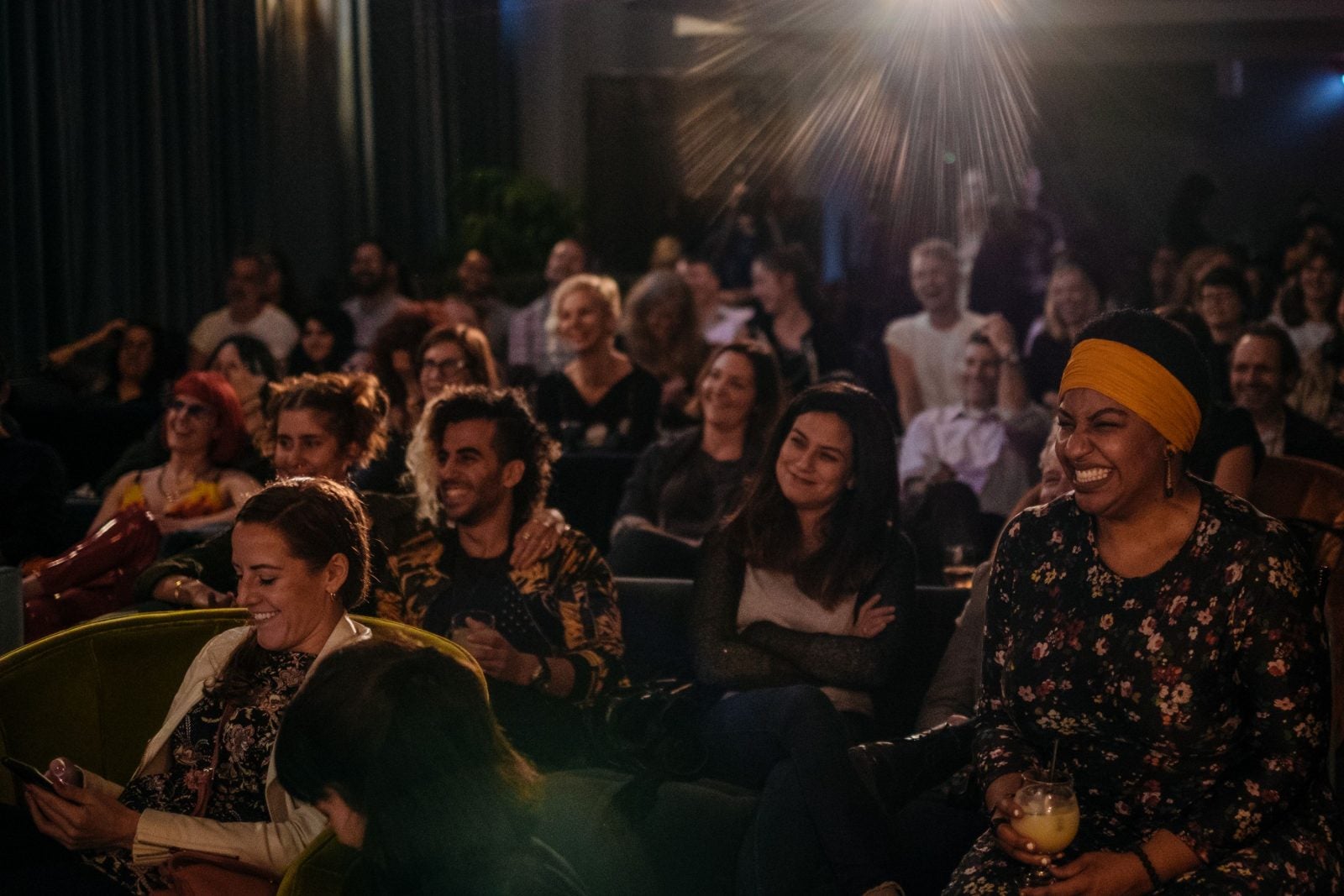
Gold Comedy isn’t the only organization to offer comedy courses aimed toward women. Organization like Upright Citizens Brigade and Second City offer amateur comedy classes in urban hubs, including improv classes for women only. Sites like WHOHAHA do an excellent job spotlighting diverse female comedians’ work and connecting performers with producers. And nonprofits like Funny Girls, run by the Harnisch Foundation, teach improv as a path to leadership for girls in underserved communities.
But according to Harris, what differentiates Gold Comedy is its goal of using online classes to democratize comedy education. The video-based courses offered by Gold are taught exclusively by female comedians, including women of color and LGBTQ women. “The vast majority of comedy education is led by people who represent the comedy norm,” says Harris—that is, “white, straight men named Norm.” While there’s nothing wrong with learning comedy from men, she believes girls and women will be far more confident in their comedic potential, and feel far more at ease, when they’re taught by hilarious women whose jokes speak to the nuances women’s lives.
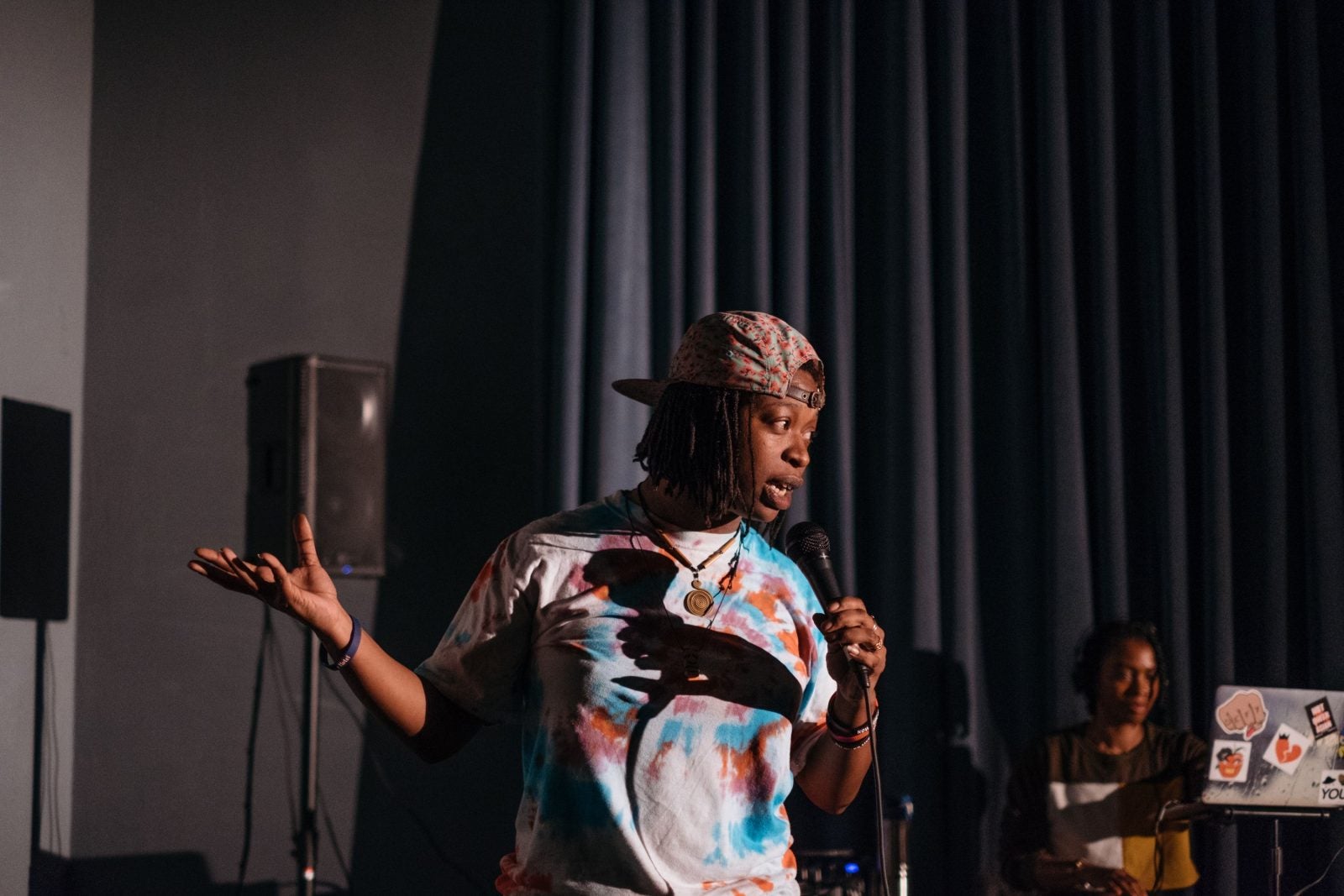
Harris is bullish about the paradigm-shifting possibilities of a world full of funny women. In the late 1990s, she recalls, she was flipping through a paper when she found a cartoon of a woman holding a sign: “Women’s humor is part of the revolution.” It was a quote is by Dale Spender, the radical Australian feminist whose theory of man-made language argues that language and discourse conventions are created and enforced by men, for men’s advantage. When women participate in public discourse, it’s almost as if they’re learning or adapting to a foreign language, according to Spender. But funny girls and women twist the conventions of popular discourse into humor. They create a language of their own.
Demanding attention
Mackenzie Heard attends one of the most progressive high schools in New York City—and, by association, one of the most progressive high schools in the world. But when the Beacon High freshman reflects on the gender dynamics in the classroom, her experience sounds a lot like Harris’s over 30 years prior.
“Boys are definitely more likely to share their opinions in class,” says Heard, noting that political debates are particularly fraught. “They almost want to get humiliated, like they want to make a joke out of themselves. For boys it’s like, if they make a good point, they make a good point. But if they don’t, then it’s still funny for all their friends, it’s still a win.”
By contrast, when girls say something smart, Heard says it’s “nothing amazing.” “But if they say something bad, or if they mess up, then it’s really bad, everyone will laugh at them.”
Those dynamics don’t exist for Heard at Gold. She’s taken three day-long Gold workshops and performed at various shows, including the Cinder Block Comedy Festival (which caused a stir in 2016 when it charged women, people of color, and LGBTQ people 33% less per ticket).
Every element of the Gold workshop is designed to help girls identify and publicly own their opinions. For homework, each student fills out responses to short prompts, including: “I hate it when ____,” “I love it when ____,” “I find it weird that ____,” “Something that makes me furious is____,” “I was mortified when____,” and “I felt totally smart when ____.”
These responses reacquaint girls with their own assertiveness and form the basis of their standup sets, which are performed for their friends and family at the end of the workshop. As Martie Cook, founding director of Emerson College’s Center for Comedic Arts, tells Quartz, “Comedy in is best form is about commenting on the world around us. It’s about things that get under your skin, so it’s empowering in the sense that gives you an identity. Because you’re forced to really sit down and question, ‘Who am I and what do I want to say?'”
For her part, Heard has seized the opportunity use her standup to push back on the sexism she experiences at school—for example, making fun of the concept of “men-ism,” created by a boy in her class who was upset about girls getting into feminism.
“A lot of the times in class I get a lot of anxiety about sharing my opinions, especially if it’s a really controversial subject, because a lot of people will immediately dispute your claim,” Heard says. “But on stage, I definitely just feel like it’s my time—a time for me to do whatever I feel like I need to do, and no one else can really say anything about it.”
The fact that standup offers girls a way to get used to speaking without worrying about being interrupted is a key part of comedy’s appeal. As Japanese comedian Yumi Nagashima explains, “When I’m on stage, I have a microphone, and no one else in the audience does. So I get to say whatever I want to, and they have to listen. And when it looks like it’s going really well, and the audience starts laughing, it’s like I’m the maestro of an orchestra—I’m controlling the waves of laughter, and nothing feels more powerful.”
The art of insecurity
Writing and performing jokes involves questioning and reshaping your relationship with your own vulnerabilities. Under the alchemy of comedy, feeling like an outsider at high school or getting dumped aren’t problems anymore; they’re material. And so programs like Gold Comedy offer girls a chance to get in front of their insecurities and re-appropriate them before they cause deep-seated damage.
Consider a Gold Comedy student named Thea, who’s taken the class three times. Ask anyone involved with Gold Comedy about the most impactful joke they’ve heard a student write, and you’ll hear her name.
One moment stands out. After just one day of standup education, Thea, a gangly, glasses-wearing tween, got on stage, hair totally disheveled, and shouted out a now-famous one-liner: ”I’m not just a nerd, I’m also a geek.”
“She has this weird sing-song when she talks, which she didn’t change at all when she got on stage,” says Harris. “She just knew instinctively that nerdy was her funny place.” While not every girl is as unique as Thea, Harris says, “they all go to this awesome place where self-effacing and confident are two sides of the same coin. “They’re making fun of themselves, but not in an Eeyore way. They’re owning exactly what would otherwise make them self-conscious.”
It’s a theory Lisa Damour, a psychologist and author of Untangled: Guiding Teenage Girls Through the Seven Transitions Into Adulthood, has repeatedly observed.
“We worry so much about girls feeling like they have to be perfect in every way, and comedy is so often about making fun of oneself, or talking openly about one’s idiosyncrasies,” Damour tells Quartz. “It’s great to think about girls being cheered on for how candid they can be about their own complexity.”
This experience is profoundly valuable during adolescence, when girls are particularly disposed toward obsessing over self-perceived imperfections. “Comedy, especially if it celebrates awkwardness and imperfection, might offer a wonderful antidote to some of the most challenging aspects of being a teenager,” says Damour.
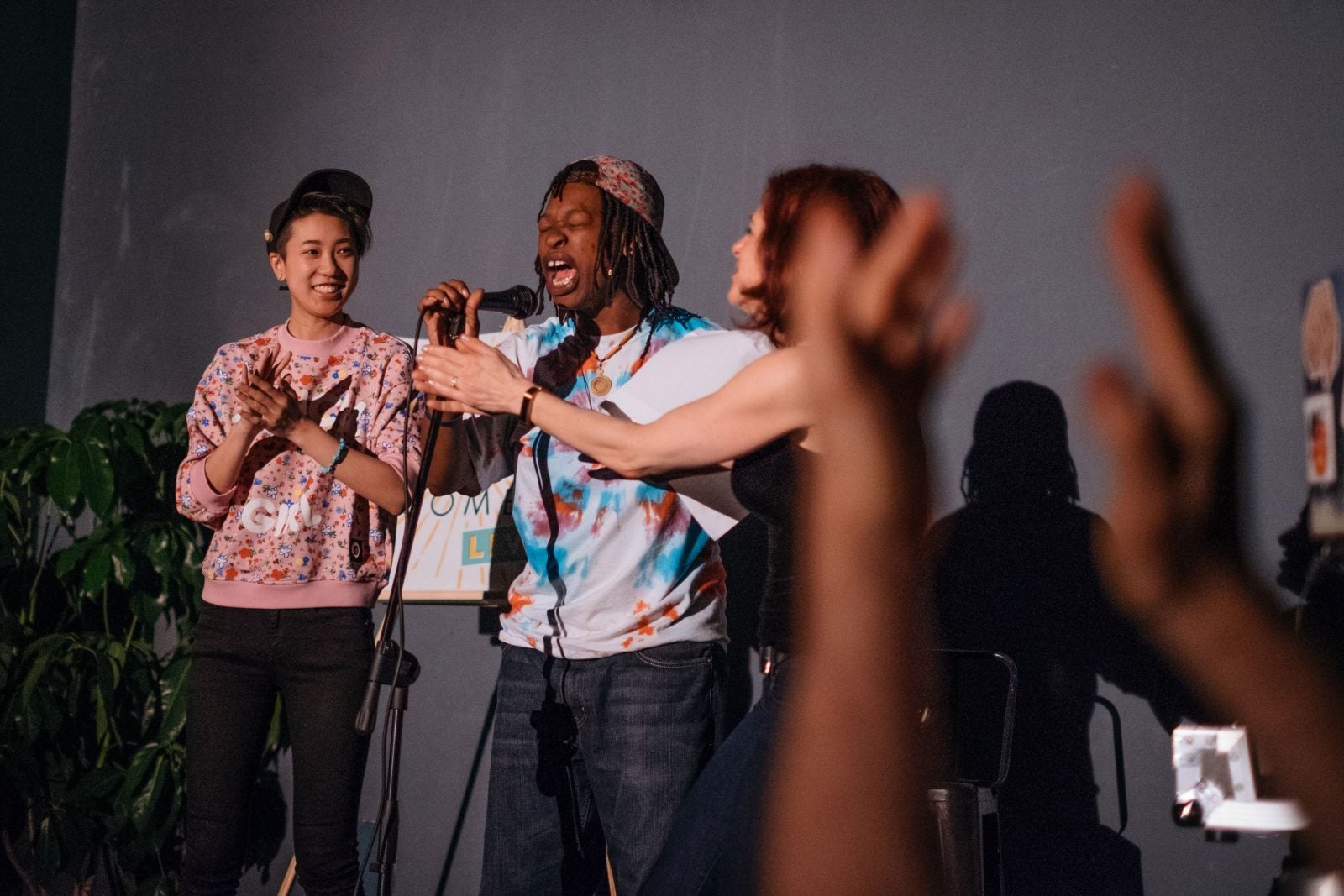
Another Gold student, a self-identified teacher’s pet, has a winning bit about how she always sits with the teachers at lunch. “It doesn’t win her popularity points, but the way she told it was so funny that we were all in love with her,” Harris says. “It doesn’t mean that she isn’t anxious about it at school, it just means that she’s in charge of her own image, and she’s not absorbing what other people think about her. She’s just like, ‘I know I sit with the teachers, and you’re rolling your eyes. So what!'”
The ability to convert insecurities into a source of levity only becomes more important as girls get older. As Cook, the Emerson professor, explains, “comedy, and the ability to laugh at yourself, takes fear away.”
Bridget Everett, a 46-year-old standup comedian and cabaret singer, spent years unable to find work because she didn’t look like a stereotypically thin chorus girl. Now she regularly brings down the house with a cabaret set called “Titties,” where she literally struts into the crowd, motor-boating people in the audience while singing about the many fabulous types of breasts there are in the world. She says she wishes her younger self had the kind of confidence that performing comedy has instilled in her.
“I wish that when I was in my twenties, or a teenager, someone would’ve shaken me and said, ‘Be like the crazy girl you were when you were at the swimming pool, just running around, pulling your pants down, doing anything to make people laugh,’” Everett says. “When you’re a toddler there’s no rules. Now I’m living like a toddler, except I can purchase alcohol.”
Rise of the teenage girls
“It’s always been bizarre to me that women and other outsiders aren’t in charge of comedy in the first place, because comedy is the ultimate outsider art,” says Harris. “One engrained definition of comedy is that it’s used to punch holes in power. So why aren’t the people who have the least power in charge?”
If comedy exists to dismantle power, it ought to be dominated by the people who are most familiar with disempowerment. Teenage girls—who are routinely sexualized, bullied, and made to question their own intelligence—certainly fit the bill. That’s why there’s so much potential in training a whole generation of young women to flood the stages of standup comedy clubs and improv classes, to crack jokes freely on dates, in class, and in job interviews.
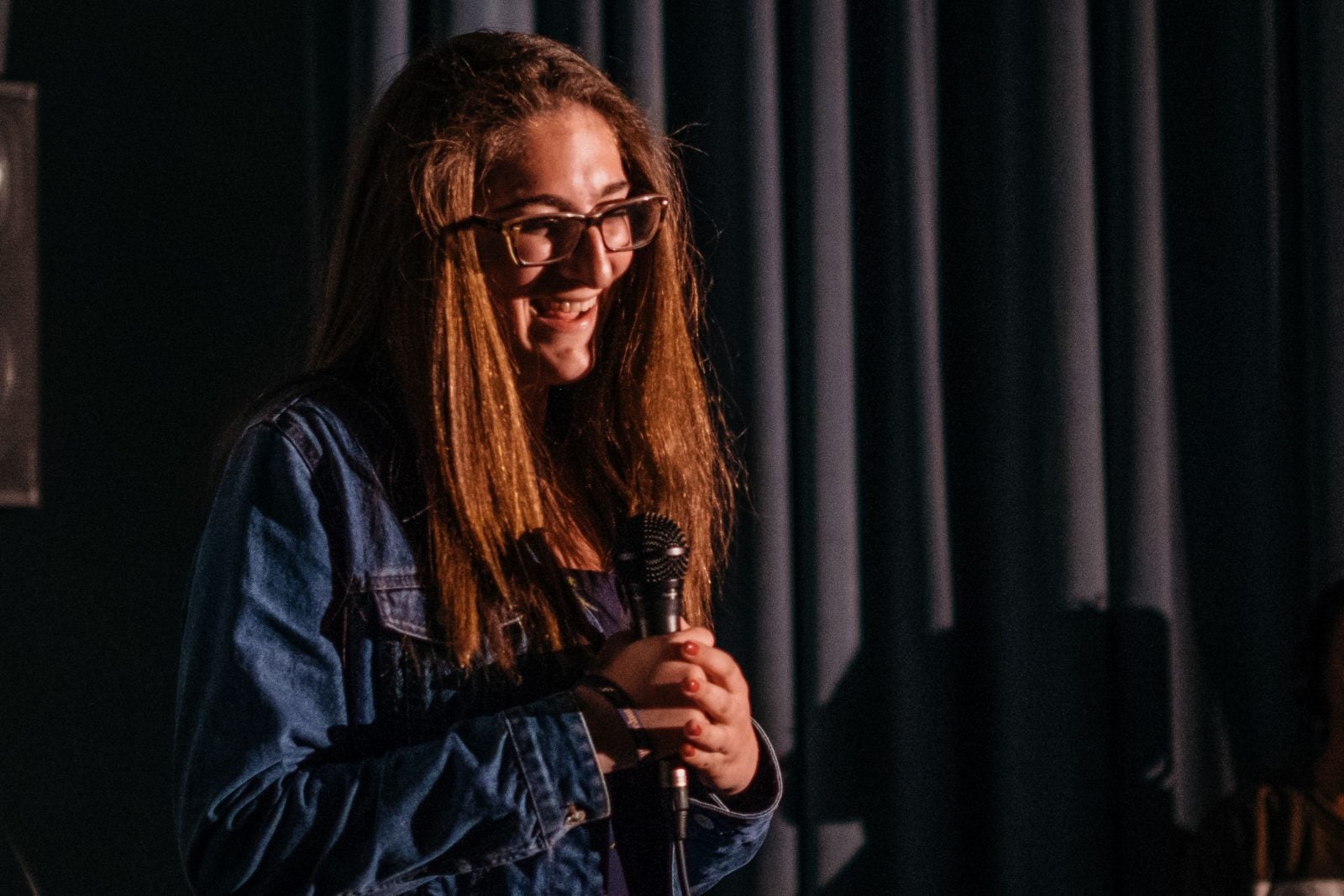
A girl who knows she’s funny is not impenetrable to pain, insecurities, heartbreak, or embarrassment. But for her, these emotions will never be static—they’ll come with the flipside of comedic opportunity. With humor as both a weapon and a shield, regardless of what’s said or done to her, she’ll be able to quite literally narrate her own experience. What’s more, she’ll bring others joy while doing so. There’s no better, or more productive, form of control.
At a live show in Brooklyn this May, a Gold Comedy teachers assistant named Avery Lender slayed the audience with a story about her slightly large nose. “When I was a little girl, I would ask my grandpa, “Why do I have this hump in my nose?” Avery said. “And he would say, ‘Well Avery, every Jewish person has a tiny rabbi that lives in the hump of your nose, and every time you sin he punches up, and makes the hump bigger.’”
This made her worry about the tiny rabbi. “So I’m just like, ‘When I get a stuffy nose, does he drown? Whenever I sneeze and people say bless you, I’m just like, ‘No, no, bless him.’” At age 16, Avery was the only performer under 30 that night. She got the most laughs.